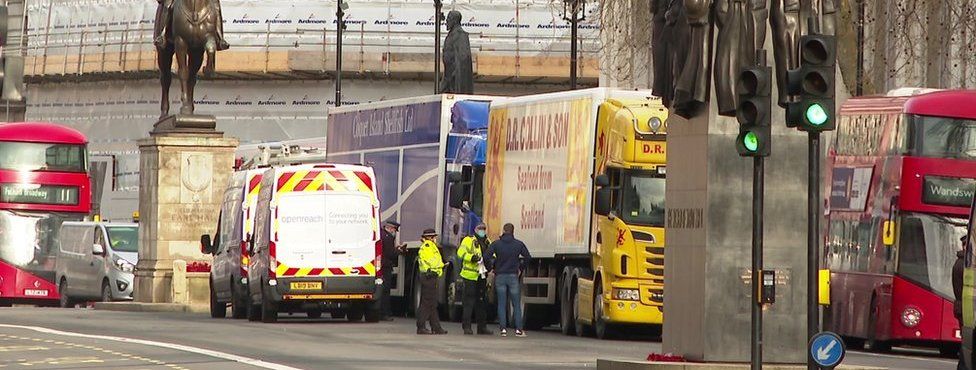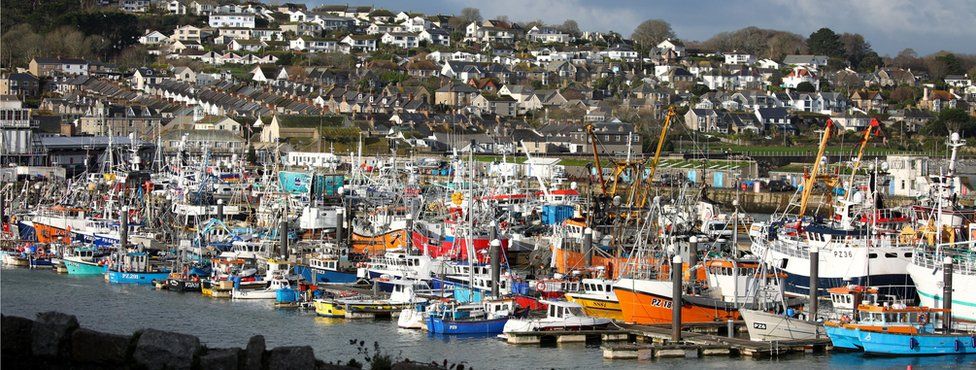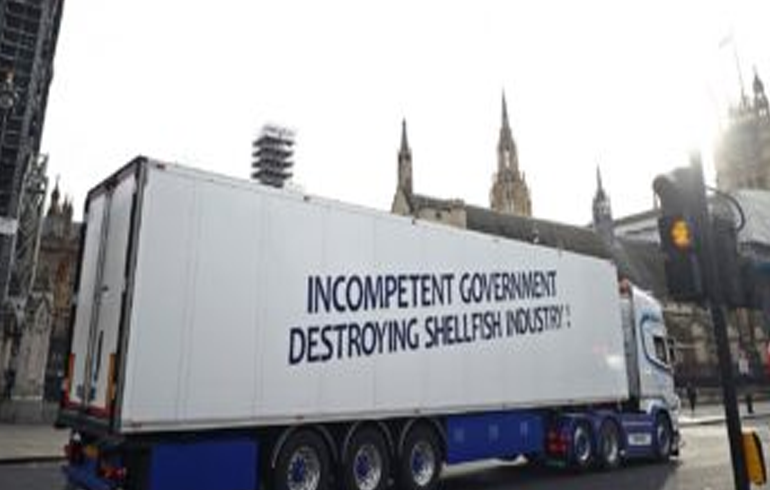Fishing businesses have staged a protest outside government departments in Westminster to highlight post-Brexit export problems they are facing.
Exports of fresh fish and seafood have been severely disrupted by new border controls since the UK’s transition period ended earlier this month.
A BBC reporter said more than 20 lorries had been driving up Whitehall in central London.
The prime minister has promised compensation for affected firms.
Industry associations have complained that extra paperwork has made it difficult to deliver fresh produce to mainland Europe before it goes off.
On Sunday, Foreign Secretary Dominic Raab said ministers were working with the sector to resolve “teething problems” faced by exporters.
Mark Moore, manager of the Dartmouth Crab Company, said his business and others were protesting to “raise awareness” of the impact of new border checks.
He told BBC Radio 5 Live his company had faced delays of up to eight and a half hours when delivering produce into the European Union.
He added that the situation was “especially difficult” for the shellfish sector, where goods were at risk of going off before reaching customers.
“It’s not about the increased documentation per se,” he said.
“We have taken that on board, and we ourselves – and I know many others – have had no issues with producing the actual paperwork.”
“It’s the volume required and the timeframe in which to produce it, which doesn’t lend itself to live shellfish and fish generally.”
At the scene

There are 24 lorries here in total, overwhelmingly from Seafood exporters in Scotland. Businesses taking part say the Brexit trade deal has left their industry high and dry.
And although one haulier from Aberdeenshire I spoke to was keen to stress that their coordinated protest was peaceful, it is clear that they all feel that direct action is now necessary to make the government sit up and take notice.
Good natured though their action was, it did for a time cause serious traffic congestion along Whitehall and Parliament Square.
However, low levels of traffic perhaps caused by the Covid lockdown meant the roads around Whitehall didn’t grind to a complete halt.
At stake, they believe, is an industry, but also thousands of livelihoods. Exporters say they are backed by fishermen who are struggling to land their catches.
And although the rural Scottish communities which are sustained by fishing might seem like a long way from the streets of SW1, the hauliers certainly made their presence felt this morning.
Having left the European Customs Union, UK exports are subject to new customs and veterinary checks which have caused problems at the border.
Some Scottish fishermen have been landing their catch in Denmark to avoid the “bureaucratic system” involved in exporting to Europe, according to Scotland’s rural economy secretary.
Boris Johnson last week told a committee of MPs that fishing firms impacted by disruption would be compensated for “temporary frustrations”.
‘Failure to prepare’
However the government is yet to provide details of this, prompting accusations of a “U-turn” from Labour.
The BBC has been told that the Department for Environment, Food and Rural Affairs (Defra) did not know about the promise of compensation before it was made by Mr Johnson.
Labour leader Sir Keir Starmer accused ministers of trying to “blame fishing communities” for problems “rather than accepting it’s their failure to prepare”.
“The government has known there would be a problem with fishing and particularly the sale of fish into the EU for years,” he told reporters.
Concerns felt outside Scotland
By Martyn Oates, BBC South West Political Editor

Much media attention has been focussed on Scotland as this export crisis has unfolded.
But exactly the same problem is rearing its head in the UK’s other great fishing stronghold – at the other end of the UK in Devon and Cornwall.
A virtual Who’s Who of South West fishing leaders wrote to the environment secretary back in November warning that the new post-Brexit export requirements would have a “seriously detrimental effect” on the industry, claiming this “could be the final straw for many businesses”.
Here, too, many fish exports have now ground to a halt and others have encountered obstacles and long delays.
And exporters have reacted angrily to the government’s repeated insistence that the issues they’ve been experiencing over the last two weeks are just “teething problems”.
Source: BBC




















































